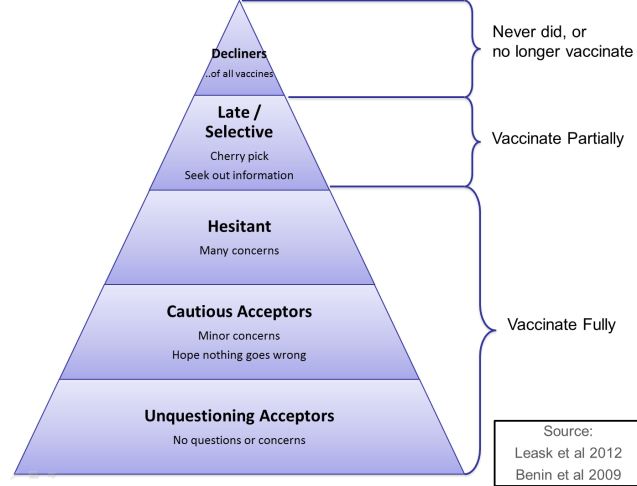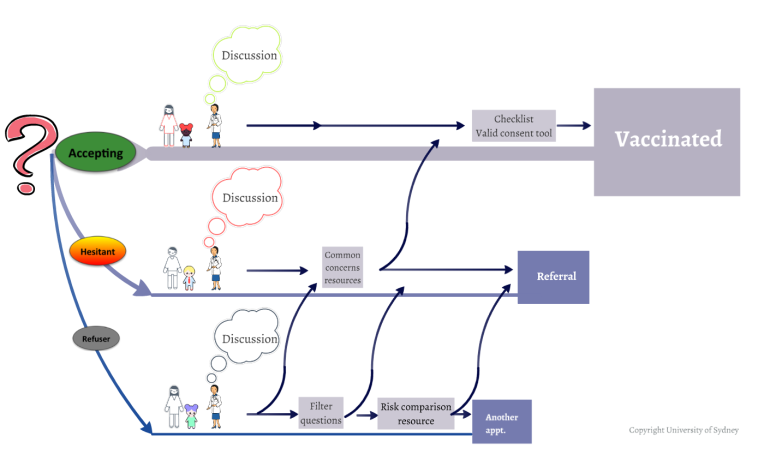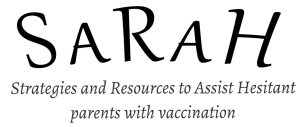Vaccines prevent many millions of deaths and illnesses globally. While most parents accept vaccination, some have questions or concerns – they sometimes struggle with the vaccination decision, trying to negotiate often highly polarised and conflicting information.
I am doing research that aims to support the uptake of recommended vaccines in ways that are respectful and supportive of parents. I want to help parents to make quality decisions for their children. Currently we are working on finding ways to improve communication about vaccination with individuals and communities that are both effective and ethically sustainable. I see communication as not just about what we say, but also how we say it and how we listen. Action and inaction are also a powerful forms of communication, whether they be by individuals, organisations or governments.
This is the first in a series of blogposts about the research I do with others in this area. In this post, I describe SARAH – “Strategies and Resources to Assist Hesitant parents with vaccination”. You can find more information about the SARAH project here http://www.ncirs.edu.au/research/social-research/sarah-project/
There is growing concern about “vaccination hesitancy”. It is not clear whether vaccination hesitancy is increasing globally but there are signs. What is “vaccination hesitancy”? Put simply, it as a psychological state where parents are unsure about whether or not to vaccinate their child. Some hesitant parents will fully vaccinate. Others will leave-out or delay certain vaccines. Hesitant parents are different from declining parents who never did or no longer vaccinate at all. Declining parents have often made their decision and are less likely to change (picture below based on a study by Benin and adapted by us here).

One of the ways to support vaccine-hesitant parents is through their discussions with health professionals. So we have developed the SARAH system. It provides tools and resources for doctors and nurses to discuss issues of concern about vaccination with parents and carers. It is designed to make vaccination decisions more informed and more satisfying for parents and health professionals. It helps health professionals allocate time with the parents who need it most – those who hesitate. It aims to move parents towards vaccinating; increase parental satisfaction and build trust in health professionals.
The picture below provides a highly simplified representation of this system and was developed by Hal Willaby. SARAH is designed like a ‘triage and treat’ system with three distinct pathways. First, it assists health professionals to identify whether parents are vaccination-accepting, hesitant or declining. Then it guides them to adapt flexible goals and appropriate strategies, including the provision of tailored information. We intend to develop a digital package to integrate into primary care. It will consist of information resources for parents; clinician discussion guides; referral system, and online training module.

This is a large program of research in three phases: (1) developing and testing resources; (2) assessing feasibility of integrating it into primary care; and (3) evaluating its effectiveness. We are attempting to capture best practice in health communication and using extensive research on what parents want to support their decision making about vaccination and what health professionals see they need to support them.
SARAH is the product of a team working together to share their knowledge and ideas. They include Nina Berry, Lyndal Trevena and Hal Willaby, University of Sydney; Margie Danchin, Murdoch Children’s Research Institute; Tom Snelling, Telethon Kids Institute; Paul Kinnersley, Cardiff University; and Holly Witteman, Laval University. Each person brings expertise in health communication, primary care, adult education, implementation science, human factors engineering, vaccinology and paediatrics. We are also consulting with other parents and health professionals. We based SARAH on a framework published here – a collaboration with Paul Kinnersley, Francine Cheater, Cath Jackson from University of York, Helen Beford, University College London and Greg Rowles who is a GP from Melbourne.
As supporters of vaccination, we want to see children protected with safe and effective vaccines. As parents we understand the challenges of raising children. We hope that SARAH can contribute to finding effective ways to help parents to make quality decisions for their children. See the NCIRS website for more information on SARAH.


Hi Julie – i am a new parent and would classify myself between a ‘cautious hesitant’ through to ‘late/selective’. I also work for government in communciation, and so am interested in improving health information on this topic not just for myself but for others. I still have some questions that aren’t covered in the fact sheets, although I appreciate their development and supportive approach to those like me that just want to understand a bit more before making a decison. Is it possible to speak with someone about specific concerns?
Hi Anna,
Thanks for the feedback. For speaking to somebody about specific concerns, call your local public health unit’s immunisation coordinator. Alternatively, if you live in a major capital city, there will be an ‘adverse events’ clinic where they mostly see parents whose children have had a possible reaction to a vaccine but are often happy to see parents who just have a lot of concerns and questions. They are staffed with nurse and paediatrician immunisation experts who have more detailed knowledge and are supportive. If those don’t work, email me at my uni email account via my bio at USYD.
All the best,
Julie
PS, Anna I am guessing the fact sheets you refer to are these http://www.ncirs.edu.au/research/social-research/sarah-project/